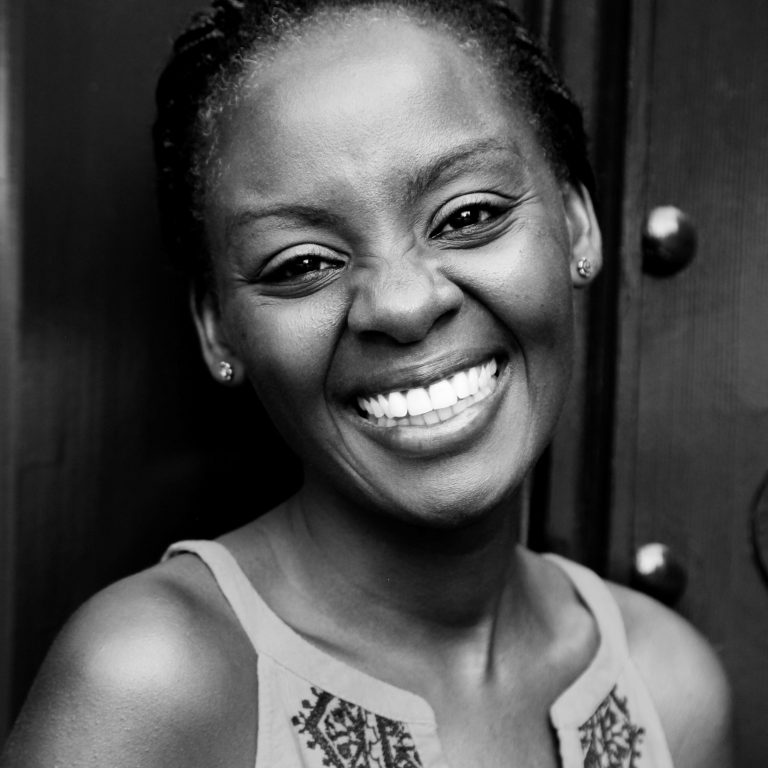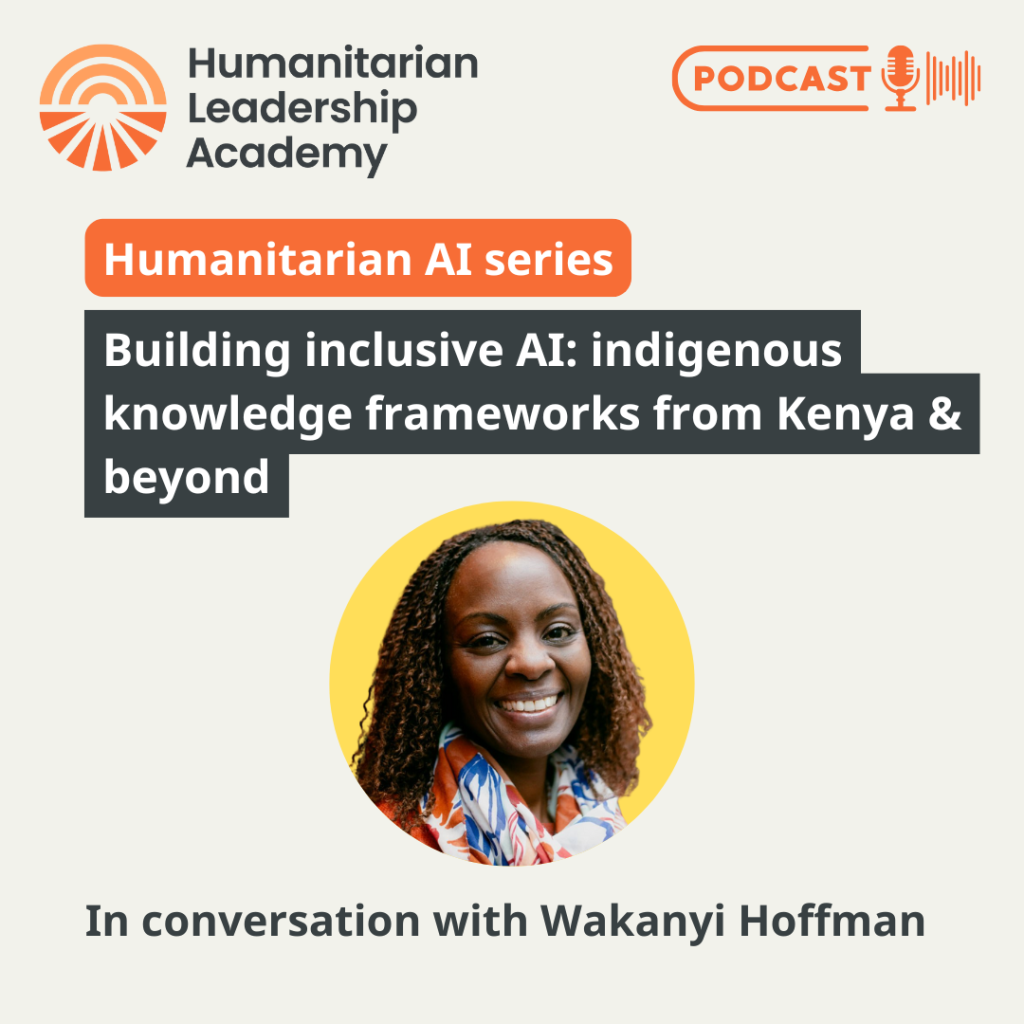6th October 2025
We’re delighted to continue with our special six-part Humanitarian AI podcast series, building on the groundbreaking research conducted by the HLA in partnership with Data Friendly Space (DFS). We’re shining a spotlight on the experts you’ll be hearing from – read on to learn about the work and perspectives of Wakanyi Hoffman.
Meet Wakanyi Hoffman – African indigenous thinker, global speaker and Ubuntu philosophy scholar whose pioneering work is at the forefront of integrating Ubuntu ethics into AI systems. We’re pleased that Wakanyi will feature on the Fresh Humanitarian Perspectives podcast as an expert guest in episode four of the Humanitarian AI series: ‘Building inclusive AI: indigenous knowledge frameworks from Kenya and beyond.’ Wakanyi shares her perspectives and experiences of inclusive AI challenges with a particular focus on Ubuntu philosophy, community engagement, and storytelling together with the HLA’s Ka Man Parkinson.
The podcast conversations build on findings and themes to emerge from the August 2025 report: How are humanitarians using artificial intelligence in 2025? Mapping current practice and future potential.

Ethics are about safeguarding right relationships so that the conditions for flourishing can be harmonious. A sustainable African AI system would take into consideration the social make up of communities because African cultures are predominantly communal. This communitarian approach to inclusivity is the central ethical consideration that should drive AI innovation in Africa.
Tell us about yourself and journey into AI and the lens through which you examine and work with it. What drew you to this intersection?
I started out my profession as a journalist in Kenya for two of the oldest mainstream newspapers, then briefly worked for a magazine that was quite controversial as ideas, trying to critique government systems and create a space for discourse and different perspectives on social issues. So I’d say my journey into inclusivity began right after college. I got interested in AI by accident. I was a fellow at the New Institute in Hamburg and my group was researching the question of non-material conditions of human flourishing. So I naturally gravitated to African ethics and Ubuntu is a word that means being human.
From there I began researching Ubuntu ethics and then AI became a mainstream discussion so I segued into talking about Ubuntu ethics for AI. Then I got invited to join the Inclusive AI Lab as the Lead Researcher for Sustainable African AI innovation, and I guess I’ve come full circle combining my activism for inclusive cultures, Ubuntu philosophy and the most current topic of today which is AI ethics.
What is a priority area in your work that links to the development of ethical AI in relation to the humanitarian and development spaces?
Indigenous knowledge, particularly the question of the right to right relationship with the land. Indigenous people need to live on indigenous land in order for indigenous knowledge to grow. The second area is in global education. The education systems that we have today, particularly in Africa, still perpetuate a colonial view of the world. In AI, there is a lot of talk about transforming the education system by providing children with personal AI tutors. I’m concerned about the kind of education that these tutors are trained on and whether or not they can contextualise learning to suit the cultural and linguistic context of African learners, indigenous and other minorities groups in the global landscape.
Through your work including at the Inclusive AI Lab, what does ethical AI mean to you and what might a sustainable African AI system involve or look like?
Ethical AI simply means building what is needed and necessary. Not every problem requires a technological solution. So when talking about ethics, we are really talking about relationships. What is the relationship between people in the same community facing a common problem, what’s the relationship between people and the land, between people and the planet? Ethics are about safeguarding right relationships so that the conditions for flourishing can be harmonious. A sustainable African AI system would take into consideration the social make up of communities because African cultures are predominantly communal. This communitarian approach to inclusivity is the central ethical consideration that should drive AI innovation in Africa.
What is Ubuntu philosophy and how does it relate to AI research and development?
Ubuntu as a word means being-human. It is this pan African understanding or logic of what it means to be a person that is a measure of your good standing in community. It is often captured in the saying, a person is a person through other persons. In this sense, Ubuntu is a form of relational intelligence. It relates to AI as far as human and machine interaction is concerned. It asks, what does it mean to be in right relationship with AI? Ubuntu places the power to the individual to exercise their right to right relationship with other people, place and planet, which includes all forms of intelligences, including AI.
Through your African Folktales Project, you’ve seen how stories can bridge traditional and contemporary worlds. What role could storytelling play in helping communities understand and shape AI systems that affect them?
We know that as human beings, we have progressed into an intelligent species for our ability to tell stories. So storytelling is our most complex technology. Communities that engage with AI ethically today will be the ones that shape a better future for the next generations of human beings. We need to understand that we are all technologists because we are all storytellers. From that perspective, we all have a responsibility to represent ourselves authentically. We are living and breathing data workers and we can either allow a few people to represent us or we can represent ourselves through an ethical engagement with emerging technologies.

About Wakanyi Hoffman
Wakanyi Hoffman is an African indigenous thinker, global speaker and Ubuntu Philosophy Scholar whose pioneering work is at the forefront of integrating Ubuntu Ethics into AI systems, leveraging it as an essential ethical framework for ensuring that these technologies create a desirable future for all. This approach highlights how the African indigenous principles of interconnectedness, compassion and dignity inherent in African Ancestral Intelligence can guide AI to reflect ethical ways of being human, thus fostering inner well-being and planetary flourishing. Wakanyi is the founder of the African Folktales Project- a digital repository of African ancestral wisdom tales that are shaping an African Indigenous Knowledge curriculum co-created with teachers all across the continent. She has also authored several children’s books. Currently, Wakanyi is the head of research for Sustainable African AI Design for the Inclusive AI Lab at the Centre for Global Challenges (UGlobe) at Utrecht University, Netherlands.
About the report and podcast series
In August 2025, the Humanitarian Leadership Academy and Data Friendly Space launched a joint report on artificial intelligence in the humanitarian sector: How are humanitarians using artificial intelligence in 2025? Mapping current practice and future potential.
Drawing on insights from 2,539 survey respondents from 144 countries and territories, coupled with deep dive interviews, this study was the world’s first baseline study of AI adoption across the humanitarian sector.
In the next phase of our initiative, we’ve produced a six-episode humanitarian AI podcast series featuring expert guests to build on the themes emerging from the research, including community-centred research, implementation barriers, governance and regulatory frameworks, cultural and ethical considerations, localisation, learning and training, and more. This first series has particular focus on the Global South and Africa due to high levels of engagement in this research from these regions.
The platform aims to promote inclusive, accessible conversations and knowledge exchange to support shared progress in the development of ethical, contextually-appropriate humanitarian AI.
